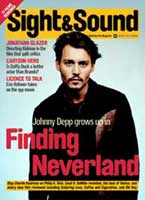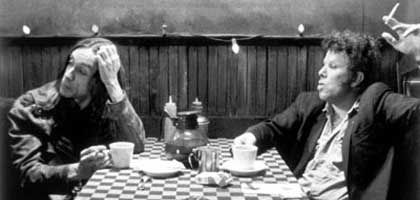
Coffee and Cigarettes
USA/Japan/Italy 2003

Reviewed by Ryan Gilbey
Synopsis
Our synopses give away the plot in full, including surprise twists.
Eleven vignettes set in diners and cafés:
'Strange to Meet You'. Following a conversation of nonsequiturs, Roberto Benigni goes along to Steven Wright's dental appointment in his place.
'Twins'. A pair of bickering twins learn from their waiter of a theory that Elvis Presley was replaced in the late stages of his career by his own twin brother.
'Somewhere in California'. Iggy Pop and Tom Waits try, but fail, to resist the lure of a packet of cigarettes.
'Those Things'll Kill Ya'. Joe and Vinny discuss the merits of coffee and cigarettes, interrupted by Vinny's mute son.
'Renée'. A woman resists offers of coffee from a waiter.
'No Problem'. Isaach anticipates bad news from his friend Alex, who insists that there is nothing wrong.
'Cousins'. Cate Blanchett meets with her cousin, Shelly, who expresses bitterness at Blanchett's lifestyle.
'Jack Shows Meg His Tesla Coil'. Jack White explains the work of Nikola Tesla to his White Stripes bandmate Meg, and unveils a replica of the Tesla Coil. When it malfunctions, Meg knows how to fix it.
'Cousins?' Alfred Molina reveals evidence to Steve Coogan that proves they are related. Coogan is reluctant to give Molina his number, until it transpires that Molina has connections.
'Delirium'. GZA and RZA, of the Wu-Tang Clan, are served in a diner by Bill Murray, who requests that they keep his presence a secret.
'Champagne'. Bill and Taylor imagine that their coffee is champagne, and that they can hear Mahler playing.
Review
The content of a typical Jim Jarmusch film has never been much to write home about. Form is clearly what excites him - or brings him as close to excitement as anyone so laconic can get. Stranger than Paradise (1984) and Down by Law (1986) were divided into clear three-act structures, with each act broken into detached, static shots. The tone of those films was dune-dry, and the audience was pathetically grateful for every joke, however meagre. In the portmanteau movies Mystery Train (1989) and Night on Earth (1992), the humour was moderately broader; Night on Earth even featured the only sighting of bawdiness in Jarmusch's hermetic universe. Recently, in Dead Man (1995) and Ghost Dog The Way of the Samurai (1999), he has dabbled unconvincingly in the mythic.
Coffee and Cigarettes, the director's ninth picture, returns to a portmanteau structure and sheds the pretensions of those recent films. Eleven monochrome segments divided among four cinematographers show performers shooting the breeze while enjoying the pleasures of the title (with the exception of the British, who sip tea). 'Shaggy-dog stories' is too grand a term for most of the vignettes here. 'Doodles' is better, though in some cases even this gives unfairly high expectations.
The quality varies greatly. In 'Cousins', Cate Blanchett plays herself and her own resentful cousin in a segment that seems intended to showcase her versatility, but plays like a Tracey Ullman skit with the fun creamed off the top. 'Renée' and 'Champagne' are enigmatic sketches in which the melancholy subtext is kept off-screen. 'Cousins?', in which Alfred Molina's sincerity shines in the company of Steve Coogan's arrogance, is the most successful chapter simply because it is about something: the assessments that people make of one another based on their usefulness. But it is also played with finesse, and Molina's role as underdog is only slightly undermined by his subsequent detour into popular success with Spider-Man 2.
Several sections predate Dead Man and Ghost Dog, and there is the suspicion in the most recently filmed parts that Jarmusch is trying to reach back to his old style. It doesn't gel. His progress over more than 20 years may have been infinitesimal, but in the realm of minimalism every movement counts. So the superficial eccentricity of the encounter between Jack and Meg White of the White Stripes ('Jack Shows Meg His Tesla Coil'), or the pow-wow between Bill Murray and two members of the Wu-Tang Clan ('Delirium'), can only look bogus when placed beside the real deal - Tom Waits and Iggy Pop surrendering to nicotine in 'Somewhere in California' (from 1992), or Steven Wright and Roberto Benigni exchanging surrealist titbits and extraterrestrial cadences in 'Strange to Meet You' (from 1986). There's a warm glow to the latter episode that can be attributed to nostalgia for a time when Tom DiCillo was a fine cinematographer instead of a mediocre director and Roberto Benigni was a funky imp, not the Robin Williams understudy that he would become.
What such incidental pleasures can't do is work up any cumulative impact. The demand on the audience to mentally reset itself after each episode would not be so great, or so exhausting, if there was a plausible sense of continuity between each segment, as there was in Night on Earth. Even that film could be divided into hits and misses, which is the danger of portmanteau works, especially when the chaff outweighs the wheat, as it does here. Jarmusch contrives links in the form of repeated dialogue, but these bids for coherence have a tacked-on feel.
Overhead shots of coffee-cup rims framed within the larger circles of trays and tables, as well as those moments when characters declare a truce through a wordless toast, serve as motifs. In all other respects the movie has the feel of a stop-gap album of random B-sides, or a batch of DVD extras best enjoyed with the fast-forward button close to hand.
Credits
- Director
- Jim Jarmusch
- Producers
- Joana Vicente
- Jason Kliot
- Written by
- Jim Jarmusch
- Cinematography
- Frederick Elmes
- Ellen Kuras
- Robby Müller
- Tom DiCillo
- Film Editing
- Jay Rabinowitz
- Melody London
- Terry Katz
- Jim Jarmusch
- Production Design
- Mark Friedberg
- Tom Jarmusch
- Dan Bishop
